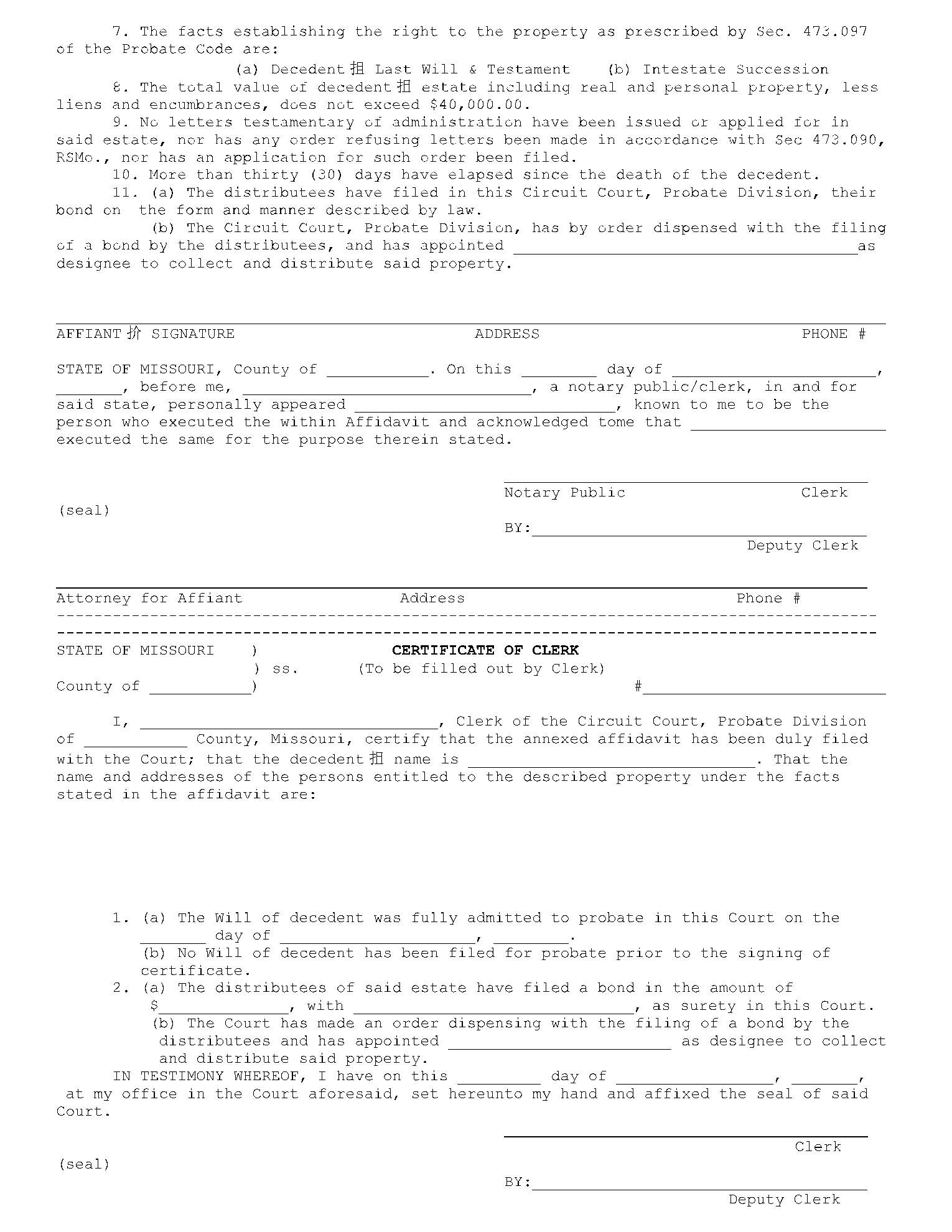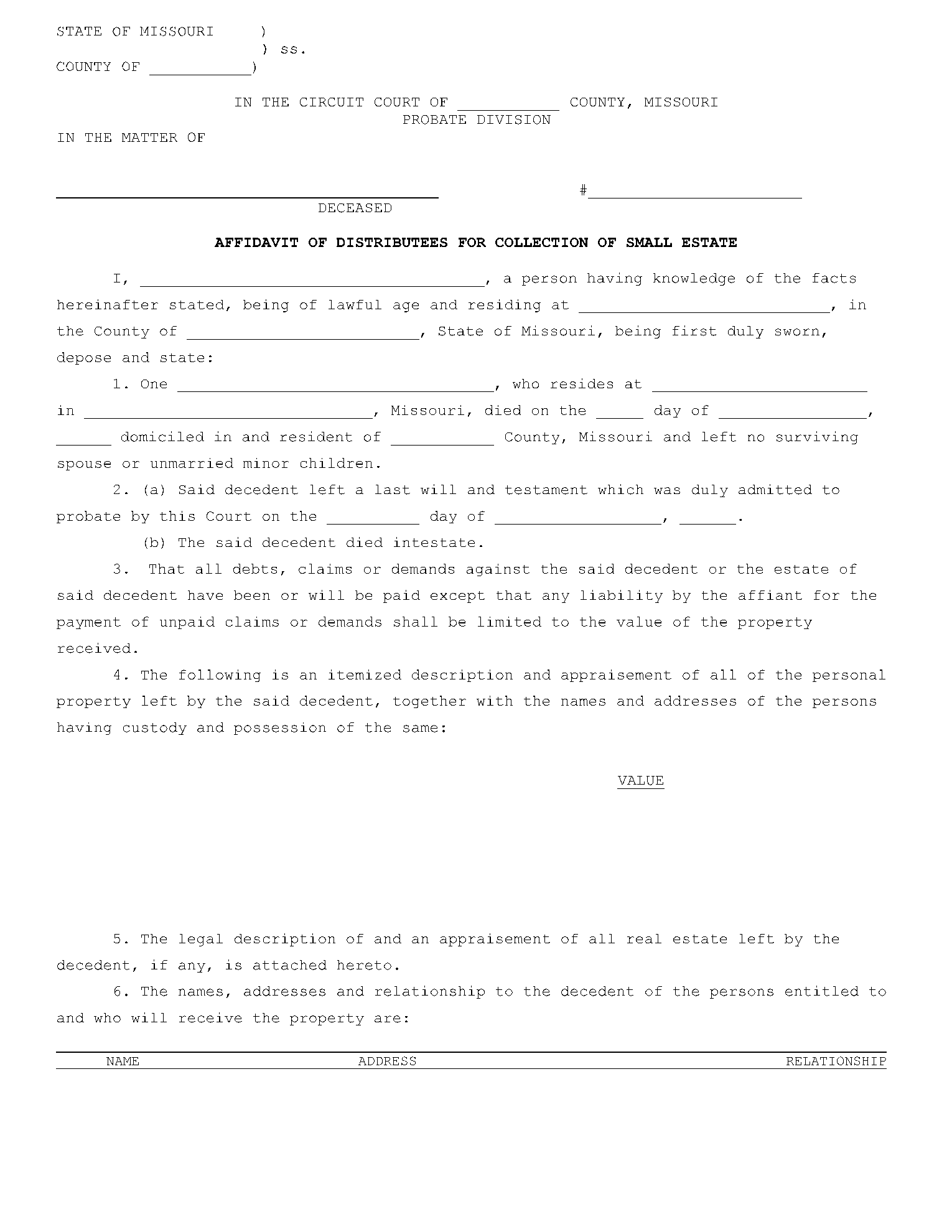In the state of Missouri, you can speed up the distribution of a small estate after a person’s death with the small estate affidavit. This document is also known as the “Affidavit of Distributees for Collection of Small Estate” in Missouri. We offer details below. If you wish to create the affidavit immediately, use the template above.
What Is a Missouri Small Estate Affidavit?
The Missouri small estate affidavit is a document that facilitates the transfer of ownership of personal assets after a person’s death. Usually, the distribution of property is handled through a probate process supervised by the court. The small estate affidavit allows you to forego this process.
In Missouri, the threshold for which assets are considered as “small” is $40,000. If the decedent’s assets are valued more as of the date of their death, you can’t use a small estate affidavit to distribute them.
In Missouri, you must file the small estate affidavit at the probate court’s office for it to be valid. After the filing, you can use the document to have property distributed by presenting it to the property holder – such as a bank.
Is it smart to file a small estate affidavit? The answer is yes, usually. It simplifies the probate process, for one. The assets can be distributed in a matter of weeks. With full probate proceedings, the court requires at least 6 months and sometimes a year to wrap up. For another, a small estate affidavit allows you to save money by foregoing court-related expenses.
What Are the Requirements for Drafting a Missouri Small Estate Affidavit?
You must comply with the Missouri Probate Code, covered under Section 473.097. Here are some of the requirements for drafting a Missouri Small Estate Affidavit:
- You must be a family member covered under state distribution laws or named a beneficiary in the will.
- The value of the assets must be less than $40,000.
- Unless the value of the assets is less than $15,000, you must publish a notification in the newspaper.
- If the assets have loans or liens against them, you must pay them off before distributing assets.
- You must agree to distribute assets according to the distribution laws.
- You must file the affidavit at the county the decedent lived in.
- You must sign the affidavit in front of a notary.
- You must attach a copy of the death certificate.
- If a Last Will exists, you must attach a copy – or state that no such document exists.
- You have to pay filing fees.
- You must attach proof of the value of any real estate, other assets, and loan amounts.
- Letters from realtors, appraisal proof, and tax appraisals may be required.
- You must wait 30 days after the death of your loved one.
How to Write a Small Estate Affidavit
Use a county-specific form and fill in the blank fields. Note that this affidavit is permissible only after 30 days after the decedent’s death. Also, you must file this document with the decedent’s local county probate court office. Here is the typical process to follow:
Provide information: All beneficiaries must have their information listed, including full names and social security numbers. For the decedent, their date of death must be mentioned.
Attach documentation: Attach the requisite documentation. Some examples include a death certificate, the will, application for probate of the will, itemized list of debts, documents supporting the debt, documents supporting the evaluation of assets, and bonds.
Sign: You, the affiant, must sign the document in front of a notary public.
Pay the fee: You must file the affidavit at the specific county office and then pay the filing fee. It costs extra to file an affidavit with a will.
Use court order: If the probate county office approves the application, it will issue a certified order. You can use this to collect assets and begin distributing them.
Conclusion
For simplified cases, you probably won’t need a lawyer. Make sure you consult the Missouri Probate Code before you complete the affidavit. If the case is complex, we recommend getting in touch with a lawyer.
Use our free Missouri Small Estate Affidavit form template to create an appropriate document. CocoSign offers a range of free templatesfor formal use and provides other helpful resources besides.

